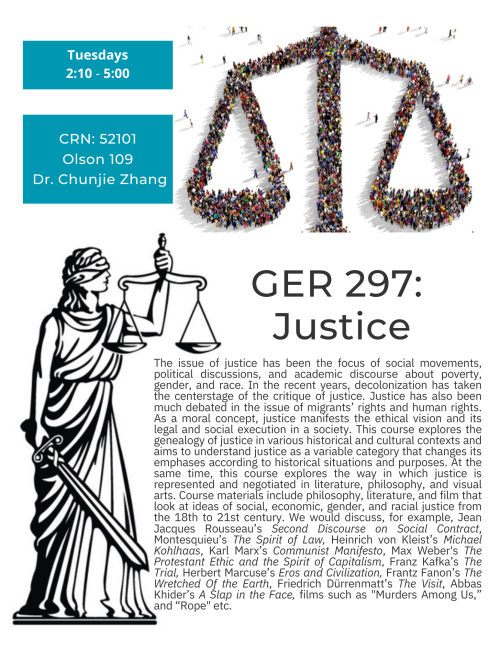GRADUATE COURSE OFFERINGS 2023-2024
**all topics courses can be repeated for credit
Fall 2023
REL 231E—History, Theory and Criticism of Human Rights (4) (Adam Zientek)
GER 297 - Special Topics in German Literature
Section 1 - Chunjie Zhang Justice
The issue of justice has been the focus of social movements, political discussions, and academic discourse about poverty, gender, and race. In the recent years, decolonization has taken the centerstage of the critique of justice. Justice has also been much debated in the issue of migrants’ rights and human rights. As a moral concept, justice manifests the ethical vision and its legal and social execution in a society. This course explores the genealogy of justice in various historical and cultural contexts and aims to understand justice as a variable category that changes its emphases according to historical situations and purposes. At the same time, this course explores the way in which justice is represented and negotiated in literature, philosophy, and visual arts. Course materials include philosophy, literature, and film that look at ideas of social, economic, gender, and racial justice from the 18th to 21st century. We would discuss, for example, Jean Jacques Rousseau’s Second Discourse on Social Contract, Montesquieu’s The Spirit of Law, Heinrich von Kleist’s Michael Kohlhaas, Karl Marx’s Communist Manifesto, Max Weber's The Protestant Ethic and the Spirit of Capitalism, Franz Kafka’s The Trial, Herbert Marcuse’s Eros and Civilization, Frantz Fanon’s The Wretched Of the Earth, Friedrich Dürrenmatt’s The Visit, Abbas Khider’s A Slap in the Face, films such as "Murders Among Us,” and “Rope" etc.

Winter 2024
REL210C:Religion in Ruins: Religious Texts and Literary Creativity in Times of Catastrophe
Prof. Eva Mroczek
Tuesdays, 2:10-5:00
This seminar begins with biblical texts that engage themes of catastrophe and disaster, and traces their later reception from ancient biblical interpretation and liturgical texts through modern and contemporary responses. We will focus especially on responses to displacement: the loss of home and the destruction or inaccessibility of religiously significant places. How do writers draw on scriptural and other foundational religious texts to respond to loss and displacement in their own times? How are older texts expanded, rewritten, echoed, and subverted in the face of new disasters, from conquest through genocide to climate change? What does this say about the uniqueness or repeatability of catastrophe? How does the experience of facing disaster affect the ability to read, write, and find meaning in literary and religious traditions? We will center our initial discussions on the Bible and its literary and liturgical heirs, but we will also read theoretical work relevant across linguistic and chronological corpora. Students will have the opportunity to engage sources from their own fields alongside the themes of the class, and do their final project on a topic in their area.
Readers of Classical Hebrew will have a chance to work with texts in the original, but this is not required. All materials will be available in English, but students who work in other languages will be encouraged to do so.
Spring 2024- no REL courses
Courses of interest that apply to the GREL course requirements.
COM 210: Translation | Theory and Practice- Archana Venkatesan
Tuesday 2:10-5:00 pm
CRN: 35687